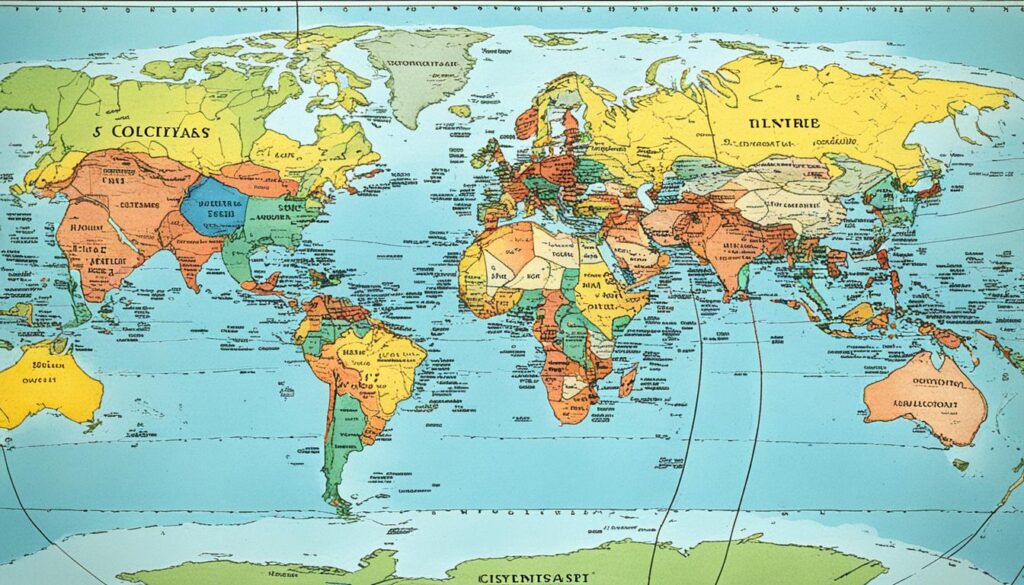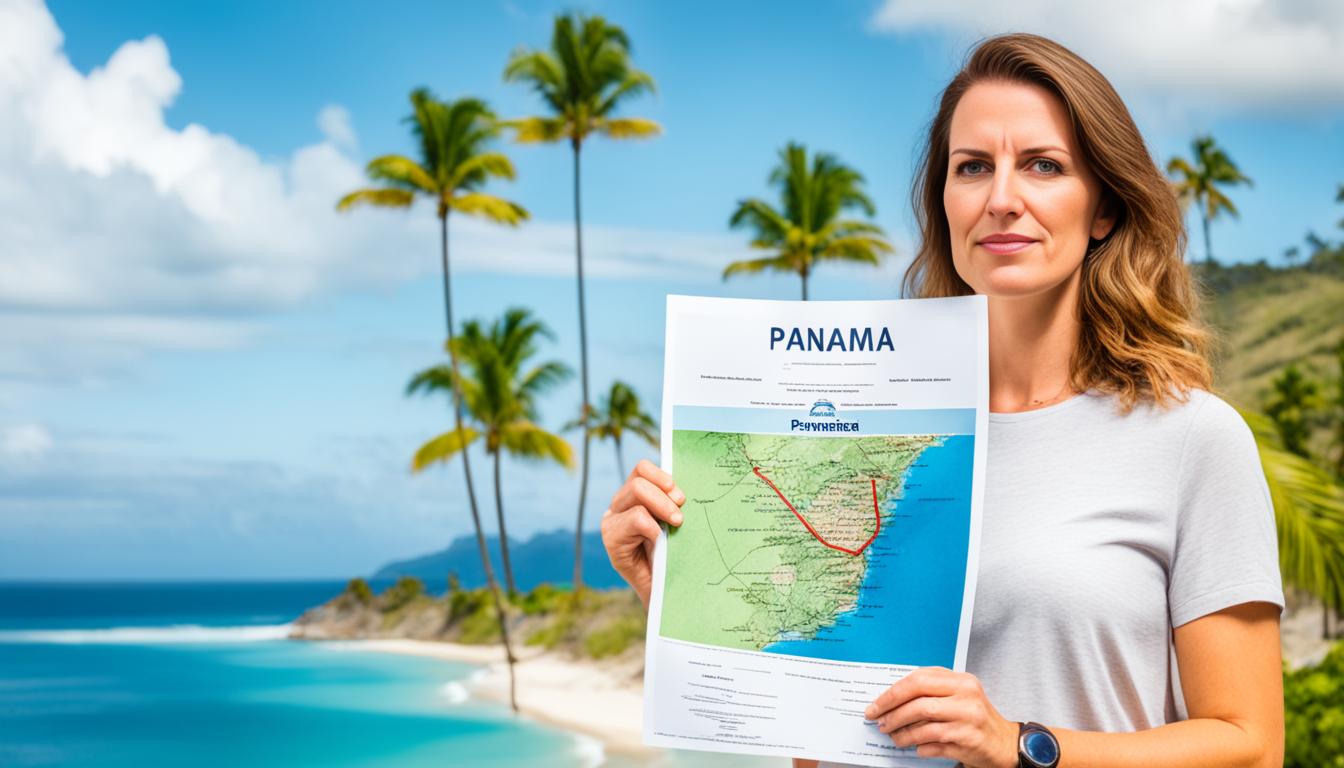Divorce proceedings can be complicated, especially for international couples living in different countries. If you are thinking about getting divorced in St. Lucia, it is crucial to understand the divorce process in this stunning Caribbean island nation. This detailed guide will give you the necessary information to navigate the divorce process in St. Lucia, covering important factors, laws, and potential challenges in cross-border divorces.
Key Takeaways:
- Getting divorced in St. Lucia involves navigating the country’s specific divorce process.
- International divorce conflicts can arise when couples have ties to more than one country.
- Filing for divorce in St. Lucia requires understanding the necessary steps and documentation.
- Child custody determinations in St. Lucia are influenced by factors such as the Hague Convention on child custody.
- Recognition and enforcement of foreign judgments can be complex in St. Lucia divorces.
Understanding International Divorce Conflicts
International divorce conflicts can be highly complex, especially when couples have ties to multiple countries. Various factors come into play when determining which country’s laws will govern the divorce proceedings. Residency, domicile, property ownership, and marriage location all play a crucial role in establishing jurisdiction in international divorce cases. It is essential for couples to grasp the basis for deciding the applicable legislation and the challenges that may arise in international divorce settlements.
When international couples decide to end their marriage, they often encounter unique legal issues that complicate the divorce process. These conflicts can arise due to differences in legal systems, cultural considerations, and language barriers. Understanding how jurisdiction is determined and the potential conflicts that may arise is crucial for international couples seeking a divorce.
Factors Influencing Jurisdiction
- Residency: The country where you currently reside may have jurisdiction over your divorce proceedings. However, residency requirements vary between countries, and different rules may apply based on the length of time spent in each country.
- Domicile: Domicile refers to the country that you consider your permanent home. Establishing domicile can be crucial in determining jurisdiction in international divorce cases.
- Marriage Location: The country where your marriage took place may have jurisdiction over your divorce. This is particularly relevant if the country has specific laws governing international marriages.
- Property Ownership: The location of shared assets, such as real estate or businesses, can also influence jurisdiction. Countries may claim jurisdiction if significant assets are located within their borders.
These factors are just a few examples of the many elements that come into play when determining jurisdiction in international divorce cases. Couples facing international divorce conflicts should seek legal advice from professionals experienced in dealing with such complex situations.
“International divorce conflicts often require a deep understanding of multiple legal systems and the complexities of cross-border relationships. Navigating these challenges requires specialized knowledge and expertise.” – Divorce Attorney Jane Williams
An experienced attorney can provide valuable guidance and advocate for your interests, helping you navigate the complex web of international divorce conflicts.
| Common Challenges in International Divorce Conflicts | Potential Resolutions |
|---|---|
| Court Jurisdiction Disputes | Seeking legal advice to determine the most favorable jurisdiction and filing divorce papers accordingly. |
| Different Legal Systems | Engaging expert legal counsel familiar with both jurisdictions to ensure compliance with each country’s laws. |
| Cultural and Language Barriers | Working with interpreters and cultural mediators to bridge communication gaps and ensure a fair and comprehensive resolution. |
Dealing with international divorce conflicts requires careful consideration of these challenges and proactive steps to address them effectively.
To illustrate the complexities involved in international divorce conflicts, consider a scenario where a couple, John and Maria, got married in the United States while residing in Canada. After a few years, their marriage deteriorated, leading to a decision to divorce. However, John moved back to the United States, while Maria stayed in Canada. In this scenario, multiple jurisdictions could potentially claim jurisdiction over the divorce proceedings, and the couple would need to navigate the complexities of international divorce conflicts.
Filing for Divorce in St. Lucia
When getting divorced in St. Lucia, couples must navigate the process of filing for divorce. This section will provide an overview of the steps involved in filing for divorce in St. Lucia, including the necessary documents, residency requirements, and the role of a lawyer in guiding couples through the process.
Divorce proceedings in St. Lucia require couples to complete several essential steps. First, couples must gather the necessary documents to initiate the process. This typically includes proof of marriage, such as a marriage certificate, as well as any relevant documentation related to assets and children.
An important consideration in filing for divorce in St. Lucia is the residency requirement. At least one party must be a resident of St. Lucia for at least one year before filing. If both parties are residents, they can file in the jurisdiction where they reside. However, if only one party is a resident, they can file in the jurisdiction where they reside or where the other party resides.
Once the required documents are gathered, couples can proceed with filing the divorce petition with the appropriate court. It is highly recommended to seek legal representation to ensure all paperwork is correctly completed and filed within the designated timeframe.
A lawyer specializing in divorce law can provide invaluable guidance throughout the process. They can help couples navigate the legal complexities, advise on the best course of action, and represent their interests in court, if necessary. Having a lawyer by their side can alleviate some of the stress associated with the divorce process and ensure a fair resolution.
It is important to note that St. Lucia follows a “no-fault” divorce system, meaning couples do not need to provide specific reasons for seeking a divorce. Once the divorce petition is filed, the court will review the case and make a decision based on the evidence presented.

“Having a lawyer by their side can alleviate some of the stress associated with the divorce process and ensure a fair resolution.”
Child Custody in St. Lucia
Child custody is a critical aspect of divorce cases in St. Lucia, particularly when international elements are involved. When determining child custody arrangements, the courts in St. Lucia consider several factors to ensure the best interests of the child. These factors include:
- The child’s age and gender
- The child’s emotional and physical needs
- Each parent’s ability to meet the child’s needs
- The child’s relationship with each parent
- Any history of abuse or neglect by either parent
- The child’s personal preferences, if they are mature enough to express them
The courts in St. Lucia strive to prioritize the child’s well-being and aim for both parents to maintain a meaningful relationship with their child, whenever possible. However, international divorces can pose additional complexities, especially when custody disputes arise between parents living in different countries.
In such cases, the Hague Convention on the International Recovery of Child Support and Other Forms of Family Maintenance can play a crucial role. The Hague Convention provides a framework for resolving international child custody disputes and ensures that decisions regarding custody and visitation rights are respected across borders.

Understanding the intricacies of child custody and the impact of the Hague Convention on international divorces is essential for couples navigating the divorce process in St. Lucia. Both parents should seek legal advice from qualified professionals specializing in international family law to ensure the best possible outcome for their child.
Recognition and Enforcement of Foreign Judgments
When couples with international backgrounds seek a divorce in St. Lucia, they may encounter challenges surrounding the recognition and enforcement of foreign judgments. It is essential to understand the complexities involved in recognizing and enforcing foreign divorce judgments within the legal framework of St. Lucia.
Recognition of foreign judgments refers to the acknowledgment by the St. Lucian courts that a divorce decree issued by a foreign jurisdiction is valid and has legal effect. Enforcing foreign judgments, on the other hand, involves the process of making sure that the terms and conditions of the foreign divorce decree are upheld and carried out in St. Lucia.
The recognition and enforcement of foreign divorce judgments in St. Lucia rely on the principle of comity, which is the willingness of one country to honor and respect the judicial decisions of another country. However, certain requirements must be met for foreign divorce judgments to be recognized and enforced in St. Lucia.
Acknowledging Recognition of Foreign Judgments
In order for a foreign divorce judgment to be recognized in St. Lucia, certain conditions must be satisfied:
- The foreign court that issued the judgment should have had jurisdiction over the divorce proceedings.
- The judgment must be final and conclusive, meaning that all appeals and reconsiderations have been exhausted.
- The judgment should not be contrary to the public policy, laws, or morals of St. Lucia.
- Both parties should have been given a fair opportunity to present their case and be properly represented.
Enforcing Foreign Judgments
Enforcing a foreign divorce judgment in St. Lucia requires a separate legal process. It involves initiating a lawsuit in St. Lucia to enforce the terms of the foreign judgment. The following factors are considered during the enforcement process:
- Whether the foreign judgment consists of monetary awards, custody arrangements, or property division.
- The legal and procedural requirements of St. Lucia that must be met for enforcement.
- Any defenses that may be raised by the party against whom enforcement is sought.
- The procedures for collecting or enforcing the foreign judgment, including the use of St. Lucian courts or other legal mechanisms.
Recognition and enforcement of foreign judgments in St. Lucia involve navigating complex legal procedures and requirements. It is advisable for individuals seeking a divorce in St. Lucia, with international elements, to consult with experienced legal professionals who specialize in international family law. These professionals can provide guidance and representation throughout the process, ensuring the proper recognition and enforcement of foreign judgments.

| Requirements for Recognition of Foreign Judgments in St. Lucia | Factors Considered in Enforcing Foreign Judgments in St. Lucia |
|---|---|
| The foreign court must have had jurisdiction over the divorce proceedings. | Types of judgments, including monetary awards, custody arrangements, or property division. |
| The judgment must be final and conclusive. | Legal and procedural requirements for enforcement in St. Lucia. |
| The judgment must not be contrary to the public policy, laws, or morals of St. Lucia. | Defenses that may be raised against enforcement. |
| Both parties should have had a fair opportunity to present their case. | Procedures for collecting or enforcing the foreign judgment. |
Division of Assets in St. Lucia Divorces
One of the significant issues in divorce cases is the division of assets, and this holds true for divorces in St. Lucia as well. When couples decide to end their marriage, the distribution of property and assets acquired during the marriage becomes a crucial aspect of the divorce settlement. St. Lucia follows specific laws and principles to ensure a fair and equitable distribution of assets between the divorcing spouses.
The division of assets in St. Lucia divorces is guided by the principles of equitable distribution, which means that the court aims to distribute the assets fairly but not necessarily equally between the parties involved. Several factors are taken into consideration by the courts when determining how assets should be divided. These factors include:
- The length of the marriage
- The contributions of each spouse to the acquisition of assets
- The financial needs of each spouse
- The earning capacity of each spouse
- The health and age of each spouse
- The presence of any dependent children
- The financial and non-financial contributions made by each spouse to the family
The court’s primary goal is to ensure a fair distribution that takes into account the unique circumstances of each case. It does not focus solely on monetary contributions but also considers the non-financial contributions made by each spouse, such as homemaking, childcare, and support for the other spouse’s career.
It is important for divorcing couples in St. Lucia to seek the advice of a qualified lawyer who specializes in family law to navigate the complexities of asset division. A skilled attorney can ensure that the court properly considers all relevant factors and works toward a fair distribution of assets that aligns with the client’s best interests.

“The division of assets in St. Lucia divorces is guided by the principles of equitable distribution, ensuring a fair and just outcome for both parties involved.”
Costs of Divorce in St. Lucia
Divorce can be a difficult and emotional process, and it often comes with financial implications as well. When considering getting divorced in St. Lucia, it is important to understand the potential costs involved. Below, we will discuss the various expenses that couples may encounter during the divorce proceedings.
Court Fees
One of the primary costs of divorce in St. Lucia is the payment of court fees. These fees vary depending on the complexity of the case and the specific services required. Generally, couples should expect to pay filing fees, which cover the administrative costs associated with initiating the divorce process.
Attorney Fees
Another significant expense in a divorce is the fees charged by attorneys. Hiring a lawyer experienced in divorce cases can provide invaluable guidance and representation throughout the proceedings. Attorney fees can vary depending on the complexity of the case, the level of involvement required, and the attorney’s expertise. Couples should consider consulting with multiple attorneys to compare costs and find a lawyer whose services align with their budget and needs.
Other Expenses
In addition to court and attorney fees, there may be other expenses that arise during the divorce process. These can include fees for document preparation, court-mandated mediation sessions, and expert witness testimonials. It is important to budget for these potential expenses and discuss them with your attorney to avoid any surprises later on.
It is worth noting that the costs of divorce can vary greatly depending on the specific circumstances of each case. Complex divorces involving significant assets, child custody disputes, or contentious legal battles tend to incur higher expenses. On the other hand, amicable divorces that can be resolved through mediation or negotiation may result in lower overall costs.
| Expense | Approximate Cost |
|---|---|
| Court Fees | $500-$1,000 |
| Attorney Fees | $5,000-$10,000 (or more) depending on complexity |
| Other Expenses | Varies greatly depending on the circumstances |
It is important for couples to carefully consider the potential costs of divorce in St. Lucia and plan accordingly. Proper financial preparation can help minimize stress and ensure that both parties are adequately represented throughout the process. Consulting with a qualified attorney can provide valuable insights into the estimated costs and help couples make informed decisions.

Considerations for International Couples
International couples who are seeking a divorce in St. Lucia should be aware of the unique challenges they may face. When navigating the process, it is important for these couples to consider several key factors.
Choosing the Applicable Laws
One of the first considerations for international couples in St. Lucia is determining which country’s laws will govern their divorce proceedings. This decision can have significant implications for issues such as property division, child custody, and spousal support. It is essential to consult with legal professionals who specialize in international divorces to understand the options and make the best choice.
Navigating Cultural Differences
International couples may encounter cultural differences that can impact their divorce proceedings in St. Lucia. These differences could include varying attitudes towards marriage and divorce, as well as different legal systems and traditions. It is important to approach these differences with sensitivity, open-mindedness, and a willingness to find common ground, respecting both parties’ cultural backgrounds.
Seeking Legal Advice
Given the complexities of divorce for international couples, it is crucial to seek legal advice from professionals who have experience handling international divorces in St. Lucia. These professionals can provide guidance on legal considerations specific to international couples, assist in navigating complex legal systems, and work towards achieving a fair and favorable settlement.
“International couples going through a divorce in St. Lucia face unique challenges that require careful consideration and expert guidance. By choosing the applicable laws, navigating cultural differences, and seeking legal advice, couples can navigate the process effectively and secure a favorable outcome.”
By keeping these important considerations in mind, international couples in St. Lucia can approach their divorce proceedings with confidence and ensure that their rights and interests are protected.
To understand the legal considerations for international couples further, refer to the following table:
| Consideration | Description |
|---|---|
| Choosing the Applicable Laws | Determining which country’s laws will govern the divorce proceedings. |
| Navigating Cultural Differences | Recognizing and respecting cultural differences that may impact the divorce process. |
| Seeking Legal Advice | Consulting with legal professionals with expertise in international divorces in St. Lucia. |

International couples going through a divorce in St. Lucia should approach the process with thoughtful consideration of the relevant legal and cultural factors. By making informed decisions and seeking the right support, international couples can navigate their divorce proceedings successfully.
Conclusion
Concluding thoughts: Navigating the divorce process in St. Lucia can be complex, especially for international couples. This guide has provided a comprehensive overview of the factors to consider, laws governing divorce in St. Lucia, and the challenges that may arise in cross-border divorces.
Summary of divorce in St. Lucia: When getting divorced in St. Lucia, couples must navigate the process of filing for divorce, child custody matters, the recognition and enforcement of foreign judgments, division of assets, and the costs involved. International couples face additional considerations, such as choosing which country’s laws to apply and understanding cultural differences during divorce proceedings.
Throughout the divorce process, it is crucial for couples to seek the guidance of experienced legal professionals who can provide the necessary support and guidance. By working closely with these professionals, couples can ensure a smooth transition into the next phase of their lives, with the reassurance that their divorce process in St. Lucia is handled efficiently and in accordance with the relevant laws and regulations.
FAQ
What factors can contribute to international divorce conflicts?
Factors such as residency, domicile, property ownership, and marriage location can all influence which country’s laws will govern the divorce proceedings, leading to potential conflicts.
What are the steps involved in filing for divorce in St. Lucia?
Couples must go through a process that includes submitting necessary documents, meeting residency requirements, and seeking guidance from a lawyer to navigate the divorce process in St. Lucia.
How is child custody determined in St. Lucia?
The courts in St. Lucia consider various factors when determining child custody, including the best interests of the child and the impact of the Hague Convention on the International Recovery of Child Support and Other Forms of Family Maintenance.
How are foreign divorce judgments recognized and enforced in St. Lucia?
Recognizing and enforcing foreign divorce judgments in St. Lucia involves following a legal framework and specific processes that ensure the judgments are upheld in accordance with St. Lucian laws.
What are the laws related to the division of assets in St. Lucia divorces?
St. Lucia follows principles of equitable distribution when dividing assets in divorces, taking into account various factors considered by the courts.
How much does divorce in St. Lucia typically cost?
The costs associated with divorce in St. Lucia can include court fees, attorney fees, and other expenses that may arise during the proceedings. The total cost can vary depending on the complexity of the case.
What considerations should international couples keep in mind when getting divorced in St. Lucia?
International couples should consider choosing which country’s laws to apply, navigating cultural differences during divorce proceedings, and seeking legal advice from professionals experienced in international divorces.
Are the Legal Processes for Divorce Similar in St. Lucia and Martinique?
When it comes to navigating divorce in Martinique and St. Lucia, the legal processes can be quite different. Each country has its own unique regulations and requirements for divorce proceedings. It’s important to seek legal counsel in the specific jurisdiction where you plan to file for divorce.










